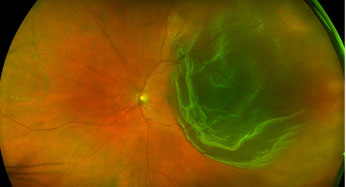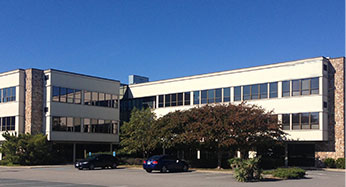Our retina specialists are board-certified ophthalmologists with advanced training in vitreoretinal surgery to diagnose and manage the full spectrum of diseases affecting the retina, macula, and vitreous.
Macular Hole
What is a Macular Hole?
A macular hole is an eye condition that involves the development of a central defect in your retina in a region known as your macula. This portion of the retina is critical for central vision and your ability to read and see faces.
Macular Hole Symptoms
Symptoms include a smudged area or blurred area in your central vision that may enlarge or worsen with time. Although these symptoms can also be experienced with other eye conditions, they are also a reason to seek medical attention from an eye doctor.
What Causes a Macular Hole?
This condition is related to aging, and usually occurs in people over the age of 60. As the eye ages, the gel like substance that fills its interior called the vitreous begins to pull away from the retina. This has the potential to cause a number of pathological conditions in the eye, of which, a macular hole is only one. As the vitreous pulls away from the macula, it can have an abnormal attachment that causes there to be traction on this portion of the retina. This vertical traction, as well as horizontal forces on the retina cause the retina to lift like a "draw-bridge," causing an opening in the retina.
In small holes with traction, about 25% of these have the potential to close on their own, while the remaining 75% will go on to develop a full thickness macular hole which can result in a permanent loss of central vision if not treated in a timely fashion. The timing of when this treatment needs to occur depends on your specific condition, but often times is recommended within 6 weeks.
Treatments for Macular Holes
The gold standard for treatment involves a vitrectomy, which is a surgical procedure performed in the operating room under a microscope. Face down positioning following the surgery is prescribed as it increases the likelihood of hole closure. Even in individuals who are unable to position, vitrectomy can be of benefit, although not as effective.
An alternative therapy that has been approved by the FDA is an injectable medication called Jetrea (Ocriplasmin). Although in studies this has been shown to successfully treat certain small macular holes, it has a significantly lower success rate. Please ask your retina specialist for further details to see if this is an option for you.
What to Expect After Treatment
After repair of a macular hole, most patients experience a significant improvement in vision, although often it does not return to normal. Macular holes that have been present for >6 months have a significantly lower rate of closure and often have more severe residual defects in central vision. Repair may still be indicated in select situations with chronic macular holes.
Online Resources
- Macular Hole - The National Eye Institute
- What Is a Macular Hole? What Causes a Macular Hole? - American Academy of Ophthalmology



